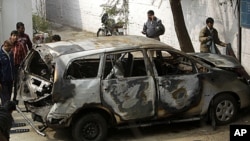Indian police have yet to locate a suspect in a bombing attack on an Israeli vehicle that Israel blames on Iran. There are no easy options for India for getting tough with Iran.
Israel has made it very clear it believes Iran is responsible for the explosion that seriously wounded a defense attache's wife in the Indian capital. And it is working hard, discreetly, to bring about diplomatic retribution.
India's influential daily, The Indian Express, reported Friday Israel is seeking New Delhi's support for a measure by the United Nations Security Council condemning the attack and censuring Iran.
India is downplaying public comments by senior Thai officials that a bombing in Bangkok was caused by a device identical to the magnet bomb attached to the Israeli vehicle here in Delhi.
Delhi police spokesman Rajan Bhagat says that information is only attributable to the Bangkok police. He says Indian investigators have not compared the explosives yet, and are not commenting.
India says it will not contemplate any action against Iran unless and until there is concrete evidence implicating Iran in this week's attack. Still, the unambiguous accusation from Israeli Prime Minister Benjamin Netanyahu that Iran was behind the attack is already creating concern among members of a massive trade delegation scheduled to head to Iran this month.
"This is unfortunate," said Vijay Setia, president of the All India Rice Exporters Association. "This escalation will definitely adversely affect the business mood of the people. People feel afraid if something goes wrong. We are concerned with the escalation of tension."
India has refused to join Western economic sanctions aimed at discouraging Iran's nuclear program, which the United States and Israel are convinced is aimed at producing weapons of mass destruction. New Delhi says it will back U.N. sanctions, but not those of individual nations.
Trade considerations
India's decision to seek dramatically increased trade with Tehran has been seen by some Western observers as irritating and opportunistic. But Delhi-based international security analyst Uday Bhaskar says trade between rapidly growing India and Iran is an unavoidable reality.
"Iran is a major oil supplier, hydrocarbon supplier, for India," said Bhaskar. "There is a dependency which is impacting national interest directly. India would find it difficult to arrive at this black and white kind of resolution in terms of dealing with Iran. And unless we have a credible alternate supplier, for India to review this, would not be an easy proposition."
In fact, India has surpassed China to become Iran's biggest oil customer - obtaining more than 12 percent of its fuel from the Islamic Republic.
In a workaround of international sanctions, the two countries are looking at an arrangement that would permit India to purchase oil in its own currency, the rupee, deposited in an Indian bank account. The rate at which those rupees would pile up puts pressure on India to export even more of its products to Iran.
Analyst Bhaskar says the interdependency between the two countries is likely to keep bilateral diplomacy low-key if Iran is found to have a role in the attack.
"In the event that this is substantiated, I think India and Iran would have to do some quiet consultation on the subject," said Bhaskar.
Apart from economic concerns, India shares centuries of cultural ties with Iran - and perceives Iran as a crucial partner in stabilizing Afghanistan after the scheduled withdrawal of U.S.-led stabilization forces in 2014.




